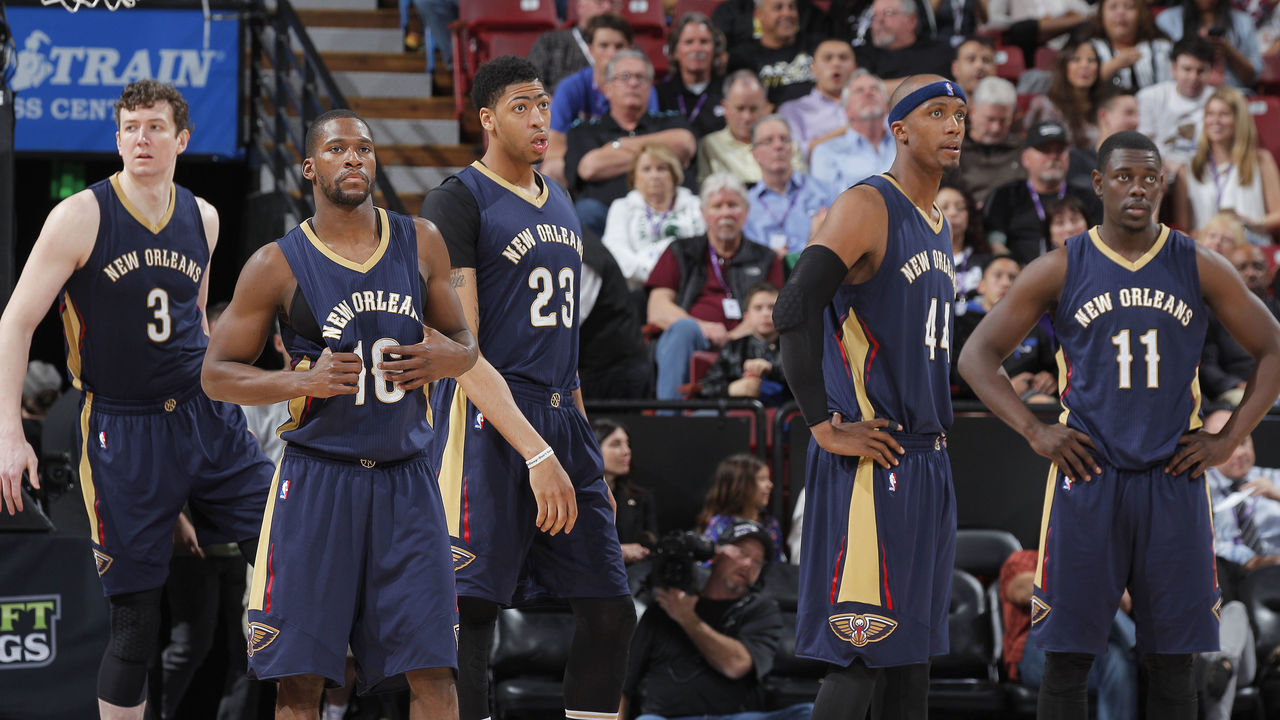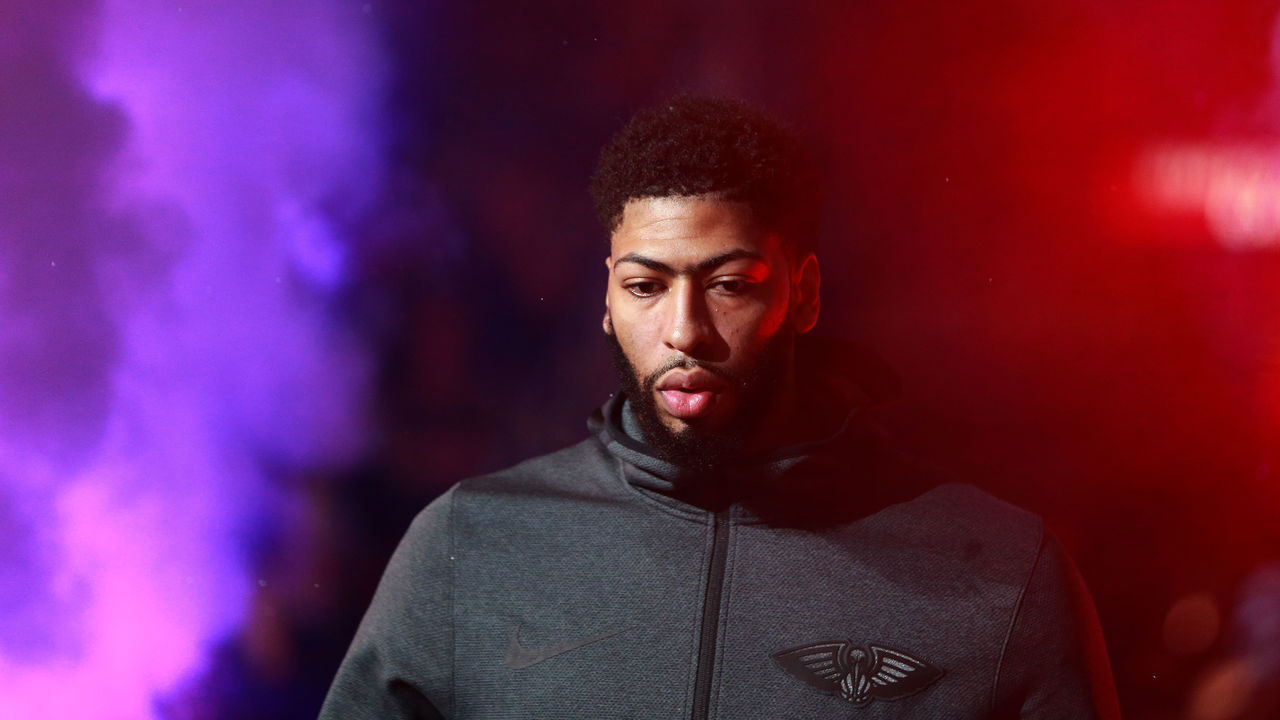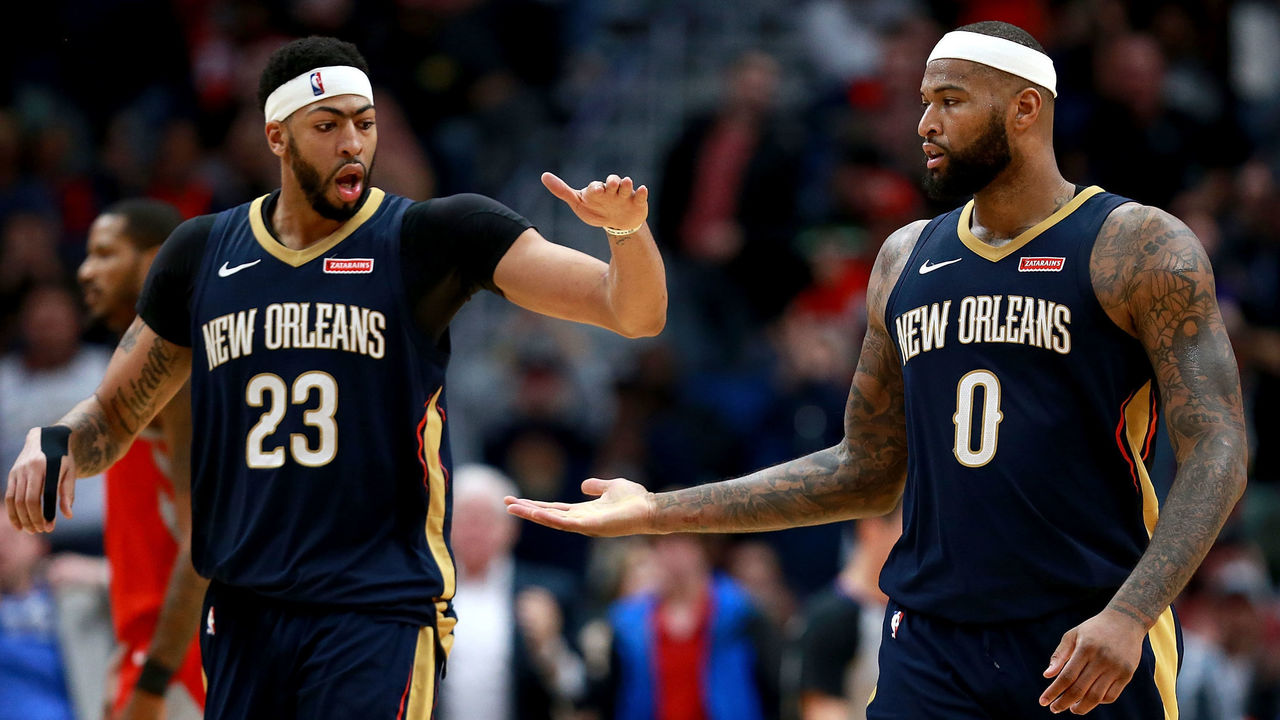Pelicans' AD era highlights tricky balance of small-market team-building
Now that he's formally asked out, we know the Anthony Davis era in New Orleans will soon come to a close, whether the curtain falls ahead of the Feb. 7 trade deadline or sometime this coming summer. It's an era that began with unbridled hope, took several frustrating turns along the way, brought a blip of joy last spring, and will ultimately end in bitter disappointment.
How did the Pelicans manage to effectively squander six-plus seasons of arguably the best big man of his generation, with just two playoff appearances and one series victory to show for it? The answer, as one might expect, is complicated.
The first and most obvious answer is that New Orleans' front office, captained throughout Davis' tenure by Dell Demps, shot itself in the foot a few times too many. If Davis' agent Rich Paul is to be believed, the three-time All-NBAer "wants to be traded to a team that allows him a chance to win consistently and compete for a championship." The Pelicans had nearly seven years to provide him that opportunity, and the bulk of the blame for their failure to do so has to land at the feet of Demps and Co.
A year after drafting Davis, they were already looking to short-circuit the rebuilding process. Some of their moves worked out, like trading their sixth overall draft pick in 2013 (Nerlens Noel) and a 2014 first-rounder (Elfrid Payton) for Jrue Holiday. Some backfired spectacularly, like dealing their 2015 first-rounder for center Omer Asik, and later re-signing Asik to a catastrophic five-year, $58-million contract that eventually cost another first-rounder to unload.
The price of those trades wasn't just paid in the assets New Orleans surrendered, but in the path the franchise consequently felt compelled to take. Even given the success of the Holiday deal, the fact that it spawned failed corresponding win-now moves - like the Asik trade and misbegotten free-agent deals for the likes of Tyreke Evans, Alexis Ajinca, and Solomon Hill - almost negates its otherwise positive impact. As Davis blossomed, the roster surrounding him increasingly reflected an incoherent team-building ideology. The Pelicans never seemed to consider patience an option.

There are plenty of different ways to build a contender, and each strategy is contingent on a certain amount of luck. On a macro level, no approach is objectively right or wrong. Still, for a team that caught maybe the most fortuitous break of the NBA's last decade by winning the 2012 draft lottery, and had plenty of time to try to nurture a sustainable nucleus around a two-way tentpole superstar, it's pretty galling that the Pelicans have made just one first-round pick in the six drafts since, and that said first-round pick (Buddy Hield) is currently flourishing elsewhere.
That New Orleans shipped out all those picks without ever managing to acquire an above-average wing is borderline malpractice. Holiday is an All-Star caliber guard and Nikola Mirotic is a wonderful role player who fits snugly next to Davis, but if that's all you have to show for more than a half-decade's worth of draft capital, something has gone wrong.
With all that said, there's no ignoring the fact that plenty of uncontrollable factors have been working against the front office's bid to retain Davis beyond his second contract, from the Pelicans' tiny market, to their volatile ownership situation, to their annual spate of untimely injuries, to the eternally unforgiving Western Conference landscape.
Davis was drafted into organizational instability, to a team that was then owned and operated by the league office. Things never settled into consistent functionality from there. New Orleans Saints owner Tom Benson bought the franchise in 2012 but shortly thereafter became embroiled in a lawsuit over who would take it over when he died (his third wife, Gayle Benson, was ultimately awarded control). Couple that legal drama with the fact that the Pelicans played in a city far more invested in football than basketball, and the team was never going to get as much consideration or care from ownership as it needed. The Bensons never spent into the luxury tax for the Pelicans, nor showed any inclination to do so.

The team's market size probably contributed to the front office's oddly urgent modus operandi. For a team that struggles to draw fans, isn't confident in its ability to lure star free agents, and likely fears its own superstar might bolt for richer pastures as soon as doing so becomes financially viable, of course a lottery season would feel that much more dire. Of course the Pelicans valued proven players over picks and prospects. Of course they felt like they had to overpay for middling free agents. The moment Davis' five-year max extension kicked in, the clock started ticking and bigger-market sharks started circling, quietly waiting for New Orleans' ship to sink.
Sure, the Pelicans could've held onto their assets and tried to rebuild through the draft. They also could've missed on those picks, and taken a different route to a similar plateau. They would've gotten just as much flak for sitting on their hands, being overly risk-averse, and failing to demonstrate to Davis that they were committed to surrounding him with a worthy supporting cast. Team-building is not a science, even if the 76ers famously did their utmost to distill it to one.
Things also might have looked a lot different if the Pelicans could ever have caught a break on the health front (or, depending on your perspective, if their medical staff hadn't failed them). Holiday's first four seasons with the team were marred by recurring right leg issues, which stemmed from a stress fracture the 76ers had failed to disclose before trading him to New Orleans. Davis picked up a handful of scrapes and bruises every year, missing time due to quad, hip, back, shoulder, ankle, toe, groin, hand, and knee injuries. (He's currently sidelined with a fractured index finger.) Last season dealt the most deflating injury blow of them all when DeMarcus Cousins - whom the Pels had traded Hield and their 2017 first-rounder to acquire a year earlier - tore his Achilles tendon.
Cousins' fit alongside Davis was imperfect, but he was the most talented teammate Davis had ever played with, and the two were in the process of nailing down the finer points of the twin-big ballet. Cousins was slated for unrestricted free agency, but he and New Orleans seemed prepared to commit to one another long term. Instead, he never played another game for the team. With Davis' free agency looming, the Pelicans couldn't afford to invest in a player who would've missed half the season and might've been a shell of himself when he returned. So they opted not to re-sign him, turning the one no-brainer trade they'd made in the Davis era into a sunk cost.

Letting Cousins walk was a justifiable decision, given the success they'd experienced after he got hurt, and they replaced him by trading for Mirotic. This season began with plenty of optimism, as the team that had eviscerated the Trail Blazers in the first round of the playoffs returned basically intact, with Julius Randle joining the fray. The Pelicans gave credence to that optimism by winning their first four games of the season ... before the injury bug bit them again. Elfrid Payton went down, then Mirotic, then Davis. Their playoff hopes steadily dwindled, and now here we are.
None of this exculpates the front office; even if the process was forgivable, those in charge still need to be held accountable for the execution, or lack thereof. But it does highlight how difficult the small-market team-building exercise can be, even when someone as talented as Davis falls into your lap. There's no roadmap, no repeatable formula, no way to plan around unforeseeable snags.
The Bucks stumbled down the same uncertain road for years with Giannis Antetokounmpo until a confluence of fortuitous factors (including a pristine bill of health) combined to catapult them into championship contention. The Jazz built the infrastructure of a contender from the ground up, getting almost every big-picture decision right, and Gordon Hayward left anyway. The Thunder couldn't convince Kevin Durant to stay even after striking the fear of God into the 73-9 Warriors and coming within a game of The Finals. LeBron James, after departing for Los Angeles, griped about how he could never convince star free agents to come join him in Cleveland.
Of course, there will always be small-market success stories to offer up as a rebuke to this line of thinking. It's basically a contractual obligation to mention the Spurs in any such discussion. Hell, the Thunder rebounded from the Durant snub and convinced Paul George to stick around. A well-run organization can overcome built-in limitations, and there's no reason to believe the Pelicans couldn't have held onto Davis if they hadn't made such a mess of their cap sheet and the back end of their roster. By all accounts, he liked New Orleans, and his trade request is the sole result of his desire to win.
The reality, however, is that the margin for error is far narrower for a team in the Pelicans' position. That reality often seemed to govern their decision-making. In many ways, their anxiety over that narrow margin helped turn the Davis era into a self-fulfilling prophecy.